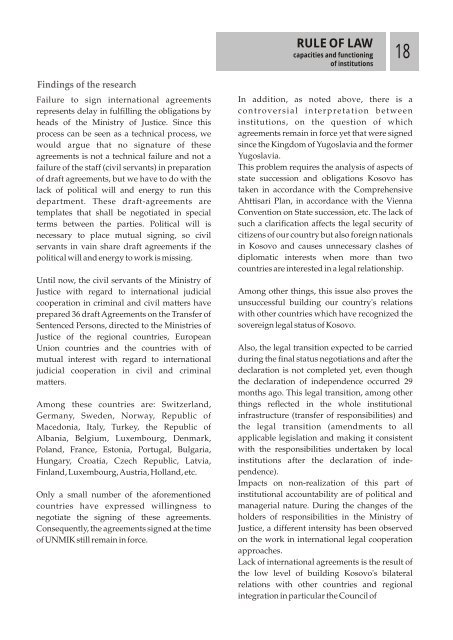You also want an ePaper? Increase the reach of your titles
YUMPU automatically turns print PDFs into web optimized ePapers that Google loves.
RULE OF LAWcapacities and functioningof institutions18Findings of the researchFailure to sign international agreementsrepresents delay in fulfilling the obligations byheads of the Ministry of Justice. Since thisprocess can be seen as a technical process, wewould argue that no signature of theseagreements is not a technical failure and not afailure of the staff (civil servants) in preparationof draft agreements, but we have to do with thelack of political will and energy to run thisdepartment. These draft-agreements aretemplates that shall be negotiated in specialterms between the parties. Political will isnecessary to place mutual signing, so civilservants in vain share draft agreements if thepolitical will and energy to work is missing.Until now, the civil servants of the Ministry ofJustice with regard to international judicialcooperation in criminal and civil matters haveprepared 36 draft Agreements on the Transfer ofSentenced Persons, directed to the Ministries ofJustice of the regional countries, EuropeanUnion countries and the countries with ofmutual interest with regard to internationaljudicial cooperation in civil and criminalmatters.Among these countries are: Switzerland,Germany, Sweden, Norway, Republic ofMacedonia, Italy, Turkey, the Republic ofAlbania, Belgium, Luxembourg, Denmark,Poland, France, Estonia, Portugal, Bulgaria,Hungary, Croatia, Czech Republic, Latvia,Finland, Luxembourg, Austria, Holland, etc.Only a small number of the aforementionedcountries have expressed willingness tonegotiate the signing of these agreements.Consequently, the agreements signed at the timeof UNMIK still remain in force.In addition, as noted above, there is acontroversial interpretation betweeninstitutions, on the question of whichagreements remain in force yet that were signedsince the Kingdom of Yugoslavia and the formerYugoslavia.This problem requires the analysis of aspects ofstate succession and obligations Kosovo hastaken in accordance with the ComprehensiveAhttisari Plan, in accordance with the ViennaConvention on State succession, etc. The lack ofsuch a clarification affects the legal security ofcitizens of our country but also foreign nationalsin Kosovo and causes unnecessary clashes ofdiplomatic interests when more than twocountries are interested in a legal relationship.Among other things, this issue also proves theunsuccessful building our country's relationswith other countries which have recognized thesovereign legal status of Kosovo.Also, the legal transition expected to be carriedduring the final status negotiations and after thedeclaration is not completed yet, even thoughthe declaration of independence occurred 29months ago. This legal transition, among otherthings reflected in the whole institutionalinfrastructure (transfer of responsibilities) andthe legal transition (amendments to allapplicable legislation and making it consistentwith the responsibilities undertaken by localinstitutions after the declaration of independence).Impacts on non-realization of this part ofinstitutional accountability are of political andmanagerial nature. During the changes of theholders of responsibilities in the Ministry ofJustice, a different intensity has been observedon the work in international legal cooperationapproaches.Lack of international agreements is the result ofthe low level of building Kosovo's bilateralrelations with other countries and regionalintegration in particular the Council of
















